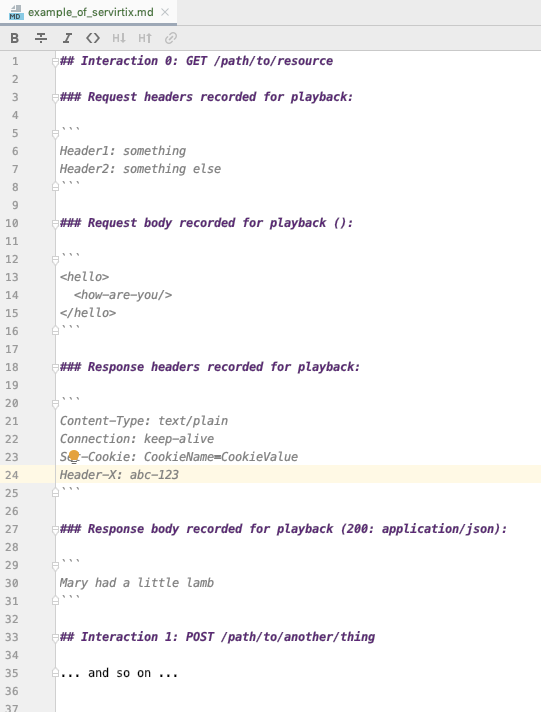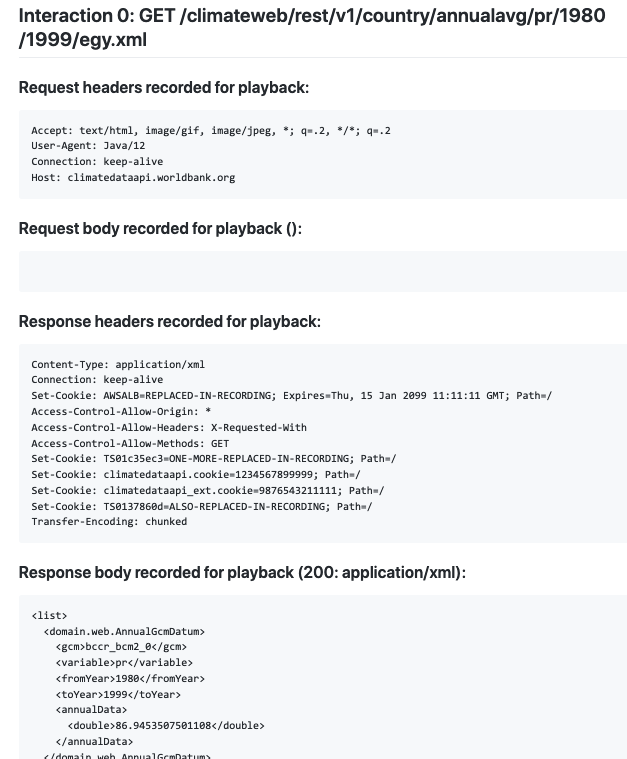Servirtium == Service Virtualized HTTP (for Java) in a record/playback style, with plain Markdown recordings
Utilization of "Service Virtualization" is best practice towards fast and consistent test automation. This tech should be used in conjunction with JUnit/TestNG, etc. Versus alternate technologies, Servirtium utilizes Markdown for recorded HTTP conversations, which aids readability allows for diffing to quickly determine if contracts are broken. That last is an important aspect when Service Virtualization is part of a Technology Compatibility Kit
Version 0.1.0: This is very much an alpha version of this gem.
Add this line to your application's Gemfile:
gem 'servirtium', git: 'git@github.com:servirtium/servirtium-ruby.git'And then execute:
$ bundle install
- By being a "man in the middle" it enables the recording of HTTP conversations and store them in Markdown under source-control co-located with the automated tests themselves.
- In playback, Servirtium allows the functionality tested in the service tests to be isolated from potentially flaky and unquestionably slower "down stack" and external remote services.
- A diffable format (regular Markdown files) to clearly show the differences between two recordings of the same conversation, that is co-located with test logic (no database of any sort).
- Agnostic about other test frameworks: use RSpec, MiniTest, or Cucumber.
- No process spawning/killing orchestration.
- One recording per test method, even if that means duplicate sections of markdown over many tests.
- No conditionals or flow control in the recording - no DSL at all.
- Allowance for modification of recording or playback for simplification/redaction purposes.
- For use in the same process as the test-runner. It is not designed to be a standalone server, although it can be used that way.
Here's a shorted source form for a recorded conversation
Best to see a real one here in situ on GitHub rather than the minimal example above. You can see the rendering there (best for human eyes), but also a snap-shot of that here:
See ExampleSubversionCheckoutRecording.md which was recorded from a real Subversion 'svn' command line client doing it's thing, but thru Servirtium as a HTTP-proxy. After the recording of that, the replay side of Servirtium was able to pretend to be Apache+Subversion for a fresh 'svn checkout' command. This one was the recorder, and this one the replayer for that recorded conversation.
-
The recorder isn't very good at handling parallel requests. Most of the things you want to test will be serial (and short) but if your client is a browser, then you should half expect for parallelized operations.
-
Servirtium can't yet listen on over HTTPS.
-
Servirtium can't yet function as a HTTP Proxy server. It must be a "man in the middle", meaning you have to be able to override the endpoints of services during test harness invocation in order to be able to record them (and play them back).
-
Some server technologies (like Amazon S3) sign payloads in a way that breaks for middle-man deployments. See S3.
Read more about two seprate uses of Servirtium for this project
The World Bank's Climate Data service turned into a Java library with Servirtium tests: https://github.com/paul-hammant/climate-data-tck. Direct, record and playback modes of operation for the same tests.
TodobackendDotComServiceRecording.md is a recording of the Mocha test site of "TodoBackend.com" against a real Ruby/Sinatra/Heroku endpoint. This is not an example of something you'd orchestrate in Java/JUnit, but it is an example of a sophisticated series of interactions over HTTP between a client (the browser) and that Heroku server. Indeed, the intent of the site is show that multiple backends should be compatible with that JavaScript/Browser test suite.
Here's the code for the recorder of that, and here's the code for the replayer for that.
Note: playback does not pass all the tests because there's a randomized GUID in the request payload that changes every time you run the test suite. It gets one third of the way through though.
Note: this limitation is being resolved, presently
As per the default port calculator for 'servirtium': 61417
The gem is available as open source under the terms of the MIT License.
Be careful: your contracts and EULAs with service providers (as well as application/server makers for on-premises) might not allow you to reverse engineer their over-the-wire APIs.
A real case: Reverse engineering of competitor’s software cost company big ... and you might say that such clauses are needed to prevent licensees from competing with the original company with arguably "stolen" IP.
We (developers and test engineers) might morally think that we should be OK for this, as we're just doing it for test-automation purposes. No matter, the contracts that are signed often make no such distinction, but the case above was where the original maker of an API went after a company that was trying to make something for the same ecosystem without a commercial relation on that specifically.
After checking out the repo, run bundle install to install dependencies.
Then, run rake to run Rubocop and the tests.
There is also a "Technology Compatibility Kit" (TCK) that can be found at: https://github.com/servirtium/demo-ruby-climate-tck
For more on TCKs, check out: https://paulhammant.com/2019/06/14/tcks-and-servirtium/
Bug reports and pull requests are welcome on GitHub at https://github.com/servirtium/servirtium-ruby. This project is intended to be a safe, welcoming space for collaboration, and contributors are expected to adhere to the code of conduct.
Everyone interacting in the Servirtium project's codebases, issue trackers, chat rooms and mailing lists is expected to follow the code of conduct.


